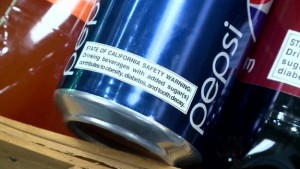Added-Sugar Is Facing Regulation Like Tobacco, and It’s About Time
In June 2015, the City of San Francisco voted to put warning labels on all advertisements for drinks with high amounts of sugar. The new law is the first in the United States. Soon, brands like Coca-Cola, Pepsi, Gatorade, and other similar companies will need to put a warning label on all advertisements for their added-sugar drinks.
The warning label will look like this:
WARNING: Drinking beverages with added sugar(s) contributes to obesity, diabetes, and tooth decay. This is a message from the City and County of San Francisco.
But the companies are fighting back. With help from the American Beverage Association (“ABA”), companies that produce sugary drinks argue that the law violates their right to free speech.
But does it violate their First Amendment rights? Is a law mandating warnings for a particular product unlawful?
Addictive Products that Require a Warning: Tobacco
The focus of the new law and debate are drinks with added-sugar. The City of San Francisco believes their citizens need to be informed or reminded that popular drinks have long-term, negative health effects. But worst of all, studies have shown that sugar is addictive, much like tobacco. 
In 2010, the largest tobacco companies sued the United States and the Food and Drug Administration (“FDA”) for infringing on the companies’ First Amendment rights. But the tobacco companies lost. The courts sided with the FDA. The court found that the U.S. government has a significant interest in protecting its citizens from the dangers of tobacco, so the government’s significant interest overrides the tobacco companies’ right to free speech.
The lawmakers in San Francisco make the same arguments to impose a mandatory warning on advertisements of sugary drinks. Drink companies may argue that sugar does not rise to the level of danger posed by tobacco. After all, it was tobacco’s severe health consequences that resulted in the government overriding tobacco companies’ right of free speech.
But what does the science say? How have the courts been understanding advances in medicine?
Consensus is that Sugar “Addiction” is Real
Studies conducted by independent researchers discovered that sugar addiction behaves just like drug addiction. They found that sugar’s effect on the brain and behavior of consumers is identical to an addiction to alcohol and illegal drugs.
Excessive sugar consumption is also being linked to a wide number of life-threatening illnesses. Illnesses like diabetes, heart disease, high blood pressure, stroke, and respiratory issues can come from excessive sugar consumption. Those are some of the leading causes of death in the nation and they can all be caused by excessive consumption of sugar.
The high number of deaths due to tobacco use is what spurred the U.S. government to enforce mandatory warning labels on tobacco products. But research shows us that added-sugar may be contributing to the staggering loss of life due to preventable illnesses.
Government initiatives to battle childhood obesity focuses on cutting down on sugar consumption. A study in 2012 determined that 17% of children/adolescents, from ages 2 to 19, are obese. The study determined that 1 in 3 children are either overweight or obese.
So are drinks companies going to face the same harsh regulation as tobacco companies?
In Time, Added-Sugar Products May Face Similar Regulation
On May 18, 2016, the ABA was denied its request for an injunction by the federal court. The case still must be decided on its merits, but denying a preliminary injunction is not looking good for drinks companies.
At the moment, the health warnings will only cover around 20% of advertisements in the city. They will not be required on television ads, radio ads, on the beverages, or menus.
Now, the ABA’s lawsuit must continue to the trial phase to determine whether the law is unconstitutional. But given the massive amount of evidence that added-sugar is as lethal as tobacco use, it is unlikely the ABA will prevail.

Comments